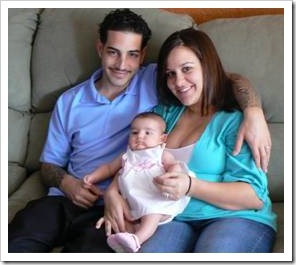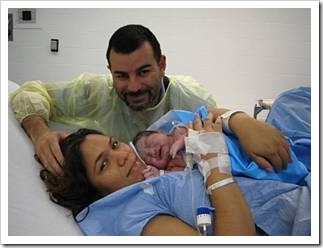 Go online any day, open your email inbox, read the papers or turn on the television and you are sure to find heaps of parenting advice, all claiming to teach you good parenting. Since you are here, even this blog is full of ideas, stories and tips on how to be the best parent you can be for your kids.
Go online any day, open your email inbox, read the papers or turn on the television and you are sure to find heaps of parenting advice, all claiming to teach you good parenting. Since you are here, even this blog is full of ideas, stories and tips on how to be the best parent you can be for your kids.
The downside of having so much information and possibly conflicting views on the same issues is that it can quickly become confusing and give you the impression that being a good parent is really hard. In fact, maybe it is so hard you are never going to be good at parenting.
Nonsense.
Good parenting is easy.
It is as easy as … 1, 2. Not even 3, just 1, 2. In parenting, the most important things are love and consistency.
Yes, really.
If you think about it, you will soon see that love and consistency provide your kids with the feeling that the world is a safe and friendly place, where they can always get support, find motivation, feel like they belong and regain strength and confidence – home.
What more did you ever need from your parents?
Good parenting principle #1: love, love, love
Yes, I know. Of course, you love your children. But do they know it too?
Really? When was the last time you checked? Have you ever asked your kids, “What can I do to make you feel that I love you with all my heart?”
 Love is not a simple thing. One of the most common questions kids ask their parents is, “Who do you love more, me or my brother Jack?” If you have ever been asked this question and made an honest attempt at answering it to yourself before issuing the standard response (“I love you just the same, kiddo”), you may have been amazed to find that your feelings towards your kids are indeed different.
Love is not a simple thing. One of the most common questions kids ask their parents is, “Who do you love more, me or my brother Jack?” If you have ever been asked this question and made an honest attempt at answering it to yourself before issuing the standard response (“I love you just the same, kiddo”), you may have been amazed to find that your feelings towards your kids are indeed different.
Sure, you love them both the same AMOUNT, but do you love them THE SAME?
In Make a list (7): ways to say I love you, you can read about the 5 languages of love, about how love can get mixed up and what you can do to make your love clearer to your kids. Still, the main thing is to make your love for your kids the foundation for everything you say to them and everything you do with them until they are absolutely certain that you love them.
Because love is a resource and sometimes, we run low or even run out. When we come home from spending a day with that annoying #*$&%^ at work and we just want some peace and quiet, your kids will be able to draw on their love reserves. To ensure they have reserves, spend some extra quality time with them, hug them and say nice things to them all weekend long and on days when you feel you can. Build up their reserves consciously and your kids will not go “empty”.
Teach your kids to ask for your love, to make it easier for you to share your love and to remember your love when you are not there. This way, they will be able to face the bully at school and say to themselves, “I don’t care what he/she thinks, because my mom and dad love me and think I’m great, so there”. They may even be able to look at the bully and share some love with him/her, because that is what bullies really need.
A friend of my parents once told them she waited for her teenage son to fall asleep at night and then she would stroke his hair and whisper loving words in his ears. My parents were shocked. Our family hugged and kissed on the way in and out of the house and shared compliments and pride freely, so they were amazed this woman could waste all day long feeling so much love and holding it back, only to do something that gave her son nothing at night. How was he supposed to know?!
Loving your kids proudly and openly is great for your kids, but it is also great for you, which then becomes great for them again… You see, when your kids look at you behaving in a loving way, they will learn to be loving too. Of course, being closest to them, they will start by showing their love to you, making your life a whole lot brighter and making it a lot easier on you to love them back (or first, whichever way you want to look at it).
Good parenting principle #2: consistency, consistency, consistency
 Domestic violence, especially towards kids, is a big issue in Australia and I imagine it is topical in other places too. It is being reported in the media and criticized on television, so everyone is aware of it.
Domestic violence, especially towards kids, is a big issue in Australia and I imagine it is topical in other places too. It is being reported in the media and criticized on television, so everyone is aware of it.
But, as the excellent comedian Russell Peters says, all immigrant kids were beaten by their parents, so why do some develop the mentality of abused children and run away as soon as anyone raises a hand in their vicinity, while others remain calm, behave politely and live a “normal” life?
Russell Peters describes his friend Ryan, who was never beaten by his parents, as an angry kid. I bet you also know some people who have gotten little or no beating from their parents, but they still behave like they were abused as kids. They lash out or withdraw, spend hours with their shrink, take medications for years and have nervous breakdowns.
I believe that regardless of their attitude towards physical or any other punishment, their academic qualifications, their political views and their income, parents who were consistent have always raised kids who felt secure in their world, while parents who acted out of impulse and handled similar situations in different ways or different situations in similar ways have always raise confused, insecure kids.
Not surprisingly, consistency is the result of knowing yourself. If you know your values and are sure about them, your kids will be clear about them. If you know your moods and triggers, you will be more calm and collected with your kids, which will help you deliver the same message every time.
Also not surprisingly, consistency must exist not only between what you say on different occasions but also between the rules you apply to yourself and what you expect of others. In other words, do you walk you own talk?
For kids, the world is a simple place. If Daddy does something, I want to do it too, so that I can be like Daddy. If Mommy wears something, I want to do it too, so that I can be pretty like Mommy. When Tsoof was 2 years old, I was a consultant and wore a tie to work. Tsoof asked for a tie and spent his afternoons (and sometimes went to kindergarten) dressed in long pants, a shirt and a tie in the Singaporean heat. He wanted to be like his daddy and we let him, because kids learn by example.
Where two parents are involved (which seems to be fewer places every minute), the kids also notice any inconsistencies between Mom and Dad. Again, when each parent knows their values, key beliefs and character, and when each parent knows the values, key beliefs and character of the other parent, things go a lot more smoothly and the kids feel safe.
 At the same time, if Mom and Dad disagree over something, the kids will “drive a wedge” between them and seemingly take advantage of the disagreement, but in their heart, they wish things were clear-cut and someone would stop them. One of the scariest things for kids is not knowing where the limits are. The solution is clearly defined rules that EVERYONE follows or suffers.
At the same time, if Mom and Dad disagree over something, the kids will “drive a wedge” between them and seemingly take advantage of the disagreement, but in their heart, they wish things were clear-cut and someone would stop them. One of the scariest things for kids is not knowing where the limits are. The solution is clearly defined rules that EVERYONE follows or suffers.
Remember your kids will literally create their whole life experience through the beliefs they adopt early in life, as in “on your shift”. Growing up in a consistent world will allow them to live their life with confidence and assurance. The consistency at home becomes their “legs to stand on” emotionally, making everything else much, much easier.
To sum things up:
- Learn about love languages
- Express your love for your kids every chance you get
- Whenever you interact with your kids, reconnect with your love for them and act out of love
- Identify the things that are important to you in life (your values)
- Identify your beliefs about life, marriage, chores, kids, school and parenting
- Share your values and beliefs with your partner and agree a common parenting philosophy
- Examine your own behavior and adjust it to be consistent with your parenting philosophy (ask your partner to do the same)
Simple, no?
Happy parenting,
Gal











